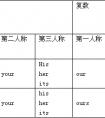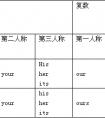按要求改写下列句子。 1.We study English together.(根据A句完成B句,使两句意思相近) ________ ________ English together. 2.The man in the white car is his father.-七年级英语
No smoking! 禁止抽烟!
No parking! 禁止停车!
No photos! 禁止拍照!
还有一些是祝词类的无动词祈使句,如:
May you succeed!祝你成功!
Long live our friendship!我们的友谊万岁!
祈使句特点口令:
祈使句无主语, 主语you常省去;
动词原形谓语当, 句首加don't否定变;
朗读应当用降调, 句末常标感叹号。
祈使句的语调特点 :
1、语音强度一般比陈述句重,书面上用叹号表示。
2、句末用降调,较长句子的后半部分几个音节速度加快。
对特定的人使用的祈使句:
祈使句如Wait here! (在这儿等着!) 可以是对一个人说,也可以是对几个人说,其主语暗含you。
但我们却可以用下列方式引起我们说话的对象的注意:
■You+祈使语气动词
You wait here for a moment. 你在这儿等一会儿。
语调和重音很重要。在上面这一句里,如果不重读you,那么句子的意思是this is where you wait (这就是你应等着的地方);
如果重读you,那么句子的意思就是this is what I want you to do (这是我要你做的事)。
此外,重读you时还可以表示愤怒、敌意或不客气。如:
You mind your own business! 不关你什么事
You try teaching 40 noisy children five days a week! 你来试试每周5天教40个吵闹的孩子!
在否定句中Don’t要重读 (不重读you)。如:
Don’t you speak to me like that! 你别这样跟我讲话!
■“you+人名”或“人名+you”
You wait here, Jim, and Mary, you wait there. 你等在这儿,吉姆;玛丽,你等在那儿。
■“祈使语气+人名”或“人名+祈使语气”:
Drink up your milk, Sally! 把你的牛奶喝光,萨利!
Sally, drink up your milk! 萨利,把你的牛奶喝光!
■祈使语气+反身代词
Enjoy yourself. 你好好享受吧。
Behave yourself. 你放规矩点。
■对一群人讲话时,祈使语气可与everybody, someone之类的词连用:
Everyone keep quiet! 大家安静!
Keep still everybody! 每个人都保持不动!
Nobody say a word! 都不许说话!
Somebody answer the phone please. 请来个人接电话。
■在表示否定的命令语气后面可用带any的复合词
Don’t say a word anybody! 谁都不要说话!
Don’t anybody say a word! 任何人都不许说话!
考点名称:不定代词
- 不定代词:
即不指明代替任何特定名词或形容词的代词。
初中常用不定代词有:
some(something,somebody,someone),any(anything,anybody,anyone), no(nothing,nobody,no one),
every(everything,everybody,everyone,),all,each,both,much,many,(a)little,(a)few,other(s),
another,none,one,either, neither等。一般来讲,修饰不定代词的词要置于其后。 不定代词用法例举:
①一般用于肯定句中的不定代词:some, someone, somebody, something
例如:They can speak some Japanese.
②一般用于否定句、疑问句和条件句中的不定代词:any, anyone, anybody, anything
例如:Is there anyone at home?
③一般用于句中表示否定意义的不定代词:no, no one, nobody, nothing
例如:I have no watch.
There is nothing wrong with the machine.
④不定代词one指代可数名词,既可指人,亦可指物,它可以代替上文中出现的单数可数
名词,指代复数名词时可以用ones。
例如:I do not have a pen, can you lend me one?
I like small cars better than large ones.
⑤none通常只用作名词,在句中作主语、宾语等。意为“没有任何(人或物)”,既可指人,亦可指物。
none后常跟of短语,其后用复数可数名词或不可数名词。
例如:None of them knows the answer to the question.
⑥both, all
both指两个人、物或群体;
all指三个以上的人、物或群体或泛指一切事物。
例如:My parents are both teachers.
All of my friends are football fans.
⑦every, each
each一般用于指两个或两个以上的人或物,侧重个别;
every用于指三个或三个以上的人或物,侧重全体。而且each所指对象在上下文中已十分明确。
例如:Each student went to see that films. (学生至少二人)
Every student went to the park.(学生至少三人)
⑧other, the other, others, the others, another
other具有名词和形容词性质,既可指人,亦可指物。other常与定冠词the连用。
不定冠词an与other连用则组成another。other只作形容词或代词,表示“其他的,别的”,不可单独使用。
例如:Do you have any other questions?
the other作形容词或代词,特指两者中或两部分的另一个或另一部分。
例如:The bookshop is on the other side of the street.
others相当于“other+名词”,泛指“别的人或物”,只有名词性用法。
例如:Some are planting trees, others are watering them.
the others相当于“the other+名词”,表示“剩下的,其余的”,特指除此之外的全部 人或物。
例如:There are forty-six students in our class. Two of them are foreign, the others are all Chinese.
another作形容词或代词,泛指三个或三个以上不定数目中的“另一个”。
例如:This pen is too expensive, please show me another.
⑨either, neither
either指“两者中的任何一个”;neither指“两者中无一”,具有否定意义。
例如:You can take either half.
Neither of the books is good.
⑩many, much, most
many和much具有名词和形容词的性质,都表示“许多、大量”。
Much一般只能指代或修饰不可数名词,many只能指代或修饰复数可数名词。Most指“大部分、大多数”。
例如:Many boys like playing soccer.
We have much homework to do every day.
Most students think so.
(11)few, a few, little, a little
a few 和a little 意为“少数、少量”,其意义是肯定的。
A few指代或修饰复数形式的可数名词,a little指代或修饰不可数名词。
Few 和little意为“几乎一点没有”,具有否定意义。
例如:He has a few friends here.
Hurry up! There is little time left.- 不定代词的用法:
不定代词大都可以代替名词和形容词,在句中作主语、宾语、表语、定语和状语。
位置
不定代词+形容词
不定代词+to do
作主语
Both of them are teachers.他们两人都是教师。
作宾语
I know nothing about this person.我对这个人一无所知。
作表语
This book is too much for a child.这本书对一个小孩来说太难了。
作定语
There is a little water in the glass.玻璃杯里有一些水。
作状语
I can't find my book anywhere.我在任何地方都不能找到我的书。
修饰不定代词的词,一般情况下要后置。
考点名称:疑问代词
疑问代词:
疑问代词在句中起名词的作用,用来构成疑问句。常用的疑问代词有:
what, who, whose, whom, which, whatever, whichever, whoever, whomever
疑问代词在句中应位于谓语动词之前,没有词性和数的变化,除who之外也没有格的变化。
what, which, whose还可作限定词。
Whose books are these on the desk?
桌上的书是谁的?
What was the directional flow of U. S. territorial expansion?
美国的领土扩张是朝哪个方向的?
What events led to most of the east of the Mississippi River becoming part of the United States?
哪些事件使密西西比河以东的大部分土地归属于美国?
疑问代词在句中起名词词组的作用,用来构成疑问句。疑问代词有下列几个:
指 人: who, whom, whose
指 物: what
既可指人又可指物: which疑问代词说明:
一、无论是做疑问代词还是限定词,which 和 what 所指的范围不同。what所指的范围是无限的,而which则指在一定的范围内,例如:
Which girls do you like best?
你喜欢哪几个姑娘?
What girls do you like best?
你喜欢什么样的姑娘?二、Whom是who的宾格,在书面语中,它作动词宾语或介词宾语,在口语中作宾语时,可用who代替,但在介词后只能用whom, 例如:
Who(m) did you meet on the street?
你在街上遇到了谁?(作动词宾语)
Who(m) are you taking the book to?
你要把这书带给谁?(作介词宾语,置句首)
To whom did you speak on the campus?
你在校园里和谁讲话了?(作介词宾语,置介词 后,不能用who取代。)
- 最新内容
- 相关内容
- 网友推荐
- 图文推荐
| [家长教育] 孩子为什么会和父母感情疏离? (2019-07-14) |
| [教师分享] 给远方姐姐的一封信 (2018-11-07) |
| [教师分享] 伸缩门 (2018-11-07) |
| [教师分享] 回家乡 (2018-11-07) |
| [教师分享] 是风味也是人间 (2018-11-07) |
| [教师分享] 一句格言的启示 (2018-11-07) |
| [教师分享] 无规矩不成方圆 (2018-11-07) |
| [教师分享] 第十届全国教育名家论坛有感(二) (2018-11-07) |
| [教师分享] 贪玩的小狗 (2018-11-07) |
| [教师分享] 未命名文章 (2018-11-07) |






